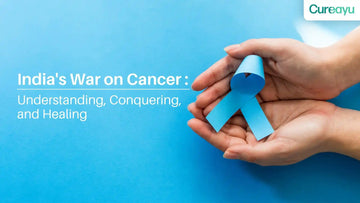Cancer, a word that many people associate with death, is a complicated and destructive disease. This blog attempts to educate readers about cancer, its prevalence in India, its causes, kinds, treatment choices, and the role of Ayurveda in its management. Knowledge is power, and by knowing cancer, we can minimize our risk and help those who are impacted.
What Is Cancer
- Cancer is a category of illnesses characterized by uncontrolled cell growth and spread.
- These cells can develop tumors or have an impact on the blood and lymphatic systems, causing problems throughout the body.
- It can arise in a variety of locations across the body, including the breast, lung, prostate, colon, and skin.
Cancer Statistics and Facts in India
- Cancer incidence in India are on the rise, with an anticipated 1.73 million new cases in 2020.
- Breast, oral, cervical, lung, and stomach cancers are common in India.
- Tobacco and alcohol usage, poor food, and physical inactivity all contribute considerably to the country’s high cancer burden.
Also Read: Understanding Diabetes: Causes, Symptoms, Types, and Treatment
What Are The Main Causes Of Cancer Disease
- Tobacco use: Smoking and using smokeless tobacco products raises the chance of developing malignancies such as lung, mouth, and throat cancer.
- Poor Diet: A diet low in fruits and vegetables and heavy in processed foods has been related to cancer.
- Environmental factors: Cancer can be caused by exposure to carcinogens such as asbestos and radon.
- Genetic factors: Inherited mutations can predispose individuals to certain forms of cancer.
- Infections: Cancer has been related to several viruses, including HPV and hepatitis B and C.
What Are The Different Types Of Cancer
- Carcinomas: Carcinomas are the most prevalent form and develop in the skin, lungs, breast, and other organs.
- Sarcomas: Sarcomas are cancerous tumors that grow in the bone, muscle, or connective tissue.
- Leukemias: Leukemias are cancers that affect the blood and bone marrow.
- Lymphomas: Lymphomas are cancers that begin in the lymphatic system.
- Central Nervous System Cancers: Tumors in the brain or spinal cord are classified as Central Nervous System Cancers.
What Are The Main Reasons For Cancer
- Aging: Cancer risk increases with age.
- Family history: A family history of cancer might predispose an individual to the illness.
- Exposure to carcinogens: Carcinogen exposure: Exposure to cancer-causing chemicals at the workplace or in the environment is a substantial risk factor.
- Lifestyle choices: Smoking, alcohol drinking, and a poor diet can all increase cancer risk.
Also Read: What Is Stress? Exploring the Types and Strategies for a Stress-Free Life
What Are The Treatments Of Cancer
- Surgery: The primary cancer treatment for localized cancer is tumor removal.
- Radiation therapy: The use of high-energy radiation to eliminate or shrink malignancies.
- Chemotherapy: Chemotherapy is the use of medications to either kill or halt the development of cancer cells.
- Immunotherapy: This treatment stimulates the immune system in order to target and eliminate cancer cells.
- Targeted therapy: Drugs that selectively target chemicals involved in cancer cell proliferation are known as targeted therapies.
Cancer Medicine
- Medications are prescribed based on the kind and stage of cancer.
- Paclitaxel, a chemotherapy medicine, and pembrolizumab, an immunotherapy, are two examples.
- Cancer research advances continue to result in the creation of new and more effective cancer treatments.
Ayurveda Advice On Cancer
- Ayurveda promotes holistic cancer care by emphasizing dietary adjustments, herbal medicines, and lifestyle improvements.
- Ayurvedic medicines such as Ashwagandha and Turmeric are recognized to have anti-cancer effects.
- A consultation with an Ayurvedic practitioner might give tailored advice.
Also Read: How to Maintain Normal Blood Pressure for a Healthier Life
Conclusion
- Cancer continues to be a difficult foe, but knowing its origins and possible therapies is critical.
- Cancer can be reduced with regular screenings, good lifestyle choices, and early detection.
- Integrating traditional and contemporary medicine can give cancer patients with complete care. Remember that education and awareness are critical in the battle against cancer.








